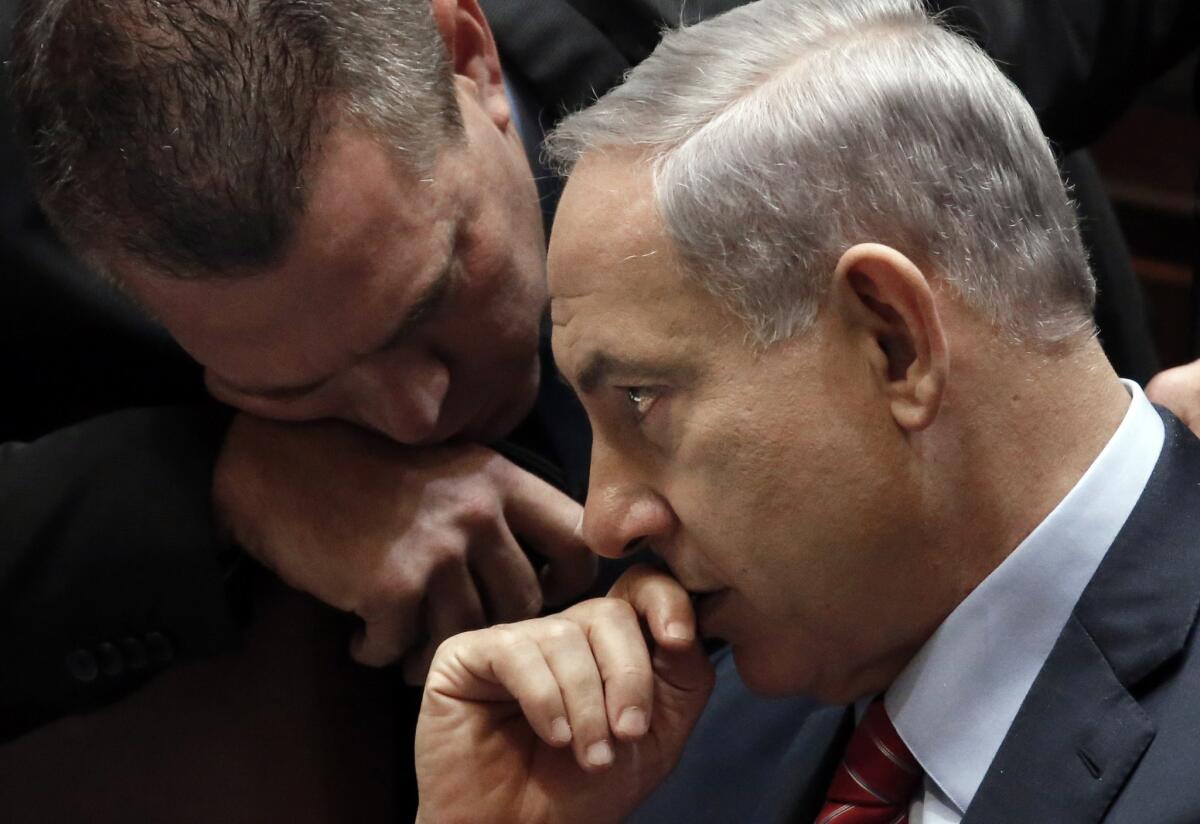Israel’s Knesset votes to disband, agrees to hold elections March 17

Israel’s parliament voted Wednesday to dissolve and hold early elections after Prime Minister Benjamin Netanyahu fired two top ministers, unraveling his governing coalition after 20 months in office.
The bill to disband the Knesset passed the first of three readings and is expected to be finalized next week.
Before the vote, lawmakers agreed to hold general elections on March 17, two years ahead of schedule.
Knesset Speaker Yuli Edelstein welcomed the early date with its short campaign period, saying, “We can’t abuse the public. We mustn’t drag this out.”
Netanyahu and what remains of his Cabinet will stay in office until the next government is formed.
On Tuesday, he dismissed Justice Minister Tzipi Livni and Finance Minister Yair Lapid, accusing them of insubordination. Four other ministers from Lapid’s centrist Yesh Atid party quit in protest.
In the aftermath of Tuesday’s dramatic developments, politicians sharpened their barbs, ushering in a fierce campaign.
Incensed at Netanyahu’s move, Livni called the prime minister a coward hiding behind “hysterical words.”
The two had clashed over a bill declaring Israel to be a Jewish state. Livni said Netanyahu cared less about the Balfour Declaration, a 1917 British statement of support for a Jewish homeland in the region, than Balfour Street, the location of the prime minister’s official residence.
“This is what these elections are really about,” Livni said.
Opposition lawmaker Zehava Galon revived a 1999 anti-Netanyahu slogan, saying: “Remember this sentence: Anyone but Bibi.”
“We’ve had enough of you,” she said. “The public says yes to democracy, peace and equality. And the public knows you failed.”
Minister Yuval Steinitz, a Netanyahu ally, directed his jabs at Lapid, accusing him of ruining the economy.
“You were an excellent television presenter,” Steinitz quipped about the popular former anchor. “Go back to doing something you’re good at … and leave the national economy and security to serious people.”
Lapid’s response came in a televised address Wednesday in which he accused Netanyahu of being “out of touch” with the public and its economic realities.
“Yesterday you stood in front of an entire nation and announced that you were dragging the country to entirely unnecessary elections which no one, except you, wants,” Lapid said. “Why? Because you are disconnected. You have no idea what it does to the citizens of Israel because you live in your aquarium.”
In Israel’s parliamentary system, voters cast ballots for a political party rather than for a prime ministerial candidate. On paper, elections are not personal. In practice, however, the vote could become a referendum on Netanyahu.
“He knows this election is about whether he deserves a fourth term,” wrote Yossi Verter, a columnist for Israel’s Haaretz newspaper.
After enjoying strong public support during the war against Hamas militants in the Gaza Strip this summer, Netanyahu’s approval ratings have dropped sharply. But he is still seen by many as the politician best suited to serve as prime minister.
Netanyahu acknowledged that he was “knowingly undertaking a personal risk” by calling early elections.
Some parties, including Netanyahu’s Likud, will hold primary elections. Others are weighing alliances and mergers, with the center-left hoping to form a big bloc. A new party is set to enter the fray, and Lapid and Livni will have to decide on their next move.
The likely disbanding of the Knesset is expected to delay new laws, reforms and other measures, including possibly a parliamentary probe into the Gaza war.
But diplomatic affairs, including relations with the Palestinians, won’t wait. In Cairo on Saturday, Palestinian Authority President Mahmoud Abbas said he had asked U.S. Secretary of State John F. Kerry to secure a commitment from Netanyahu to halt the construction of Jewish settlements in the West Bank and release a group of prisoners as a condition for the resumption of peace negotiations.
Netanyahu’s government is not likely to agree to Abbas’ demands after losing its moderate flank.
If Palestinians don’t get a response from Israel, Abbas is threatening to seek a resolution from the United Nations Security Council setting a two-year deadline for Israeli forces to withdraw from the West Bank.
Abbas has also said that Palestinians would seek to join organizations such as the International Criminal Court, a move that could expose Israel as well as Palestinian militant groups to war crimes investigations.
Sobelman is a special correspondent.
More to Read
Sign up for Essential California
The most important California stories and recommendations in your inbox every morning.
You may occasionally receive promotional content from the Los Angeles Times.










